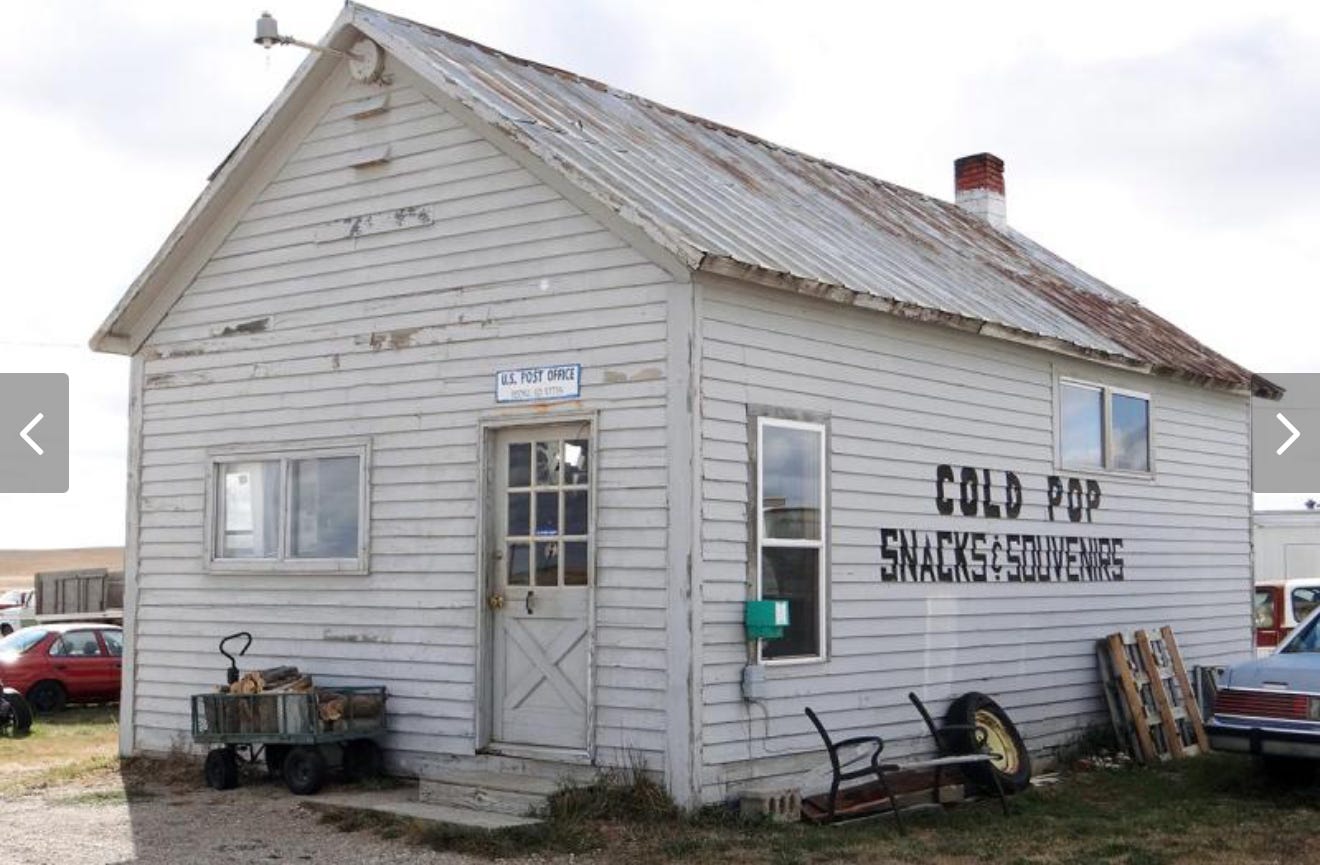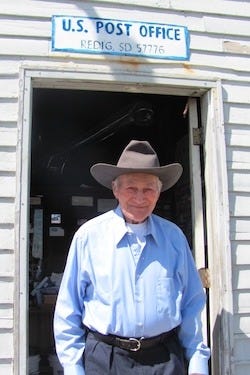Unsung: He Never Ran for Office, but He Ran a Town
The Man Who Outlasted Presidents
Edgar Kumley wasn’t famous. He never ran for office, never owned a business empire, never even left Harding County, South Dakota, for long.
But for 65 years, he ran one of the most important rooms in town: the post office.
He was appointed postmaster of Redig, South Dakota, by President Harry S. Truman in 1949. Back when stamps were three cents, and “going to town” was a full-day event. He kept the title until 2015. Not because he had to. Because the job needed doing.
He died this month at the age of 102. And the kind of life he lived, we don’t see a lot of it anymore.
The Postmaster Was the Most Reliable Person You Knew
If you didn’t grow up rural, this might be hard to picture. But the postmaster wasn’t just someone behind a counter handing you your mail.
In small towns, especially those that are isolated, the post office is the heartbeat. It’s where the world meets your corner of it. It’s how your prescriptions arrive. It’s where the baby formula gets dropped off, or the Social Security check, or the note from your son stationed overseas. It’s where you learn who passed away, who moved back, and who got married.
If the grocery store is gone and the gas station’s boarded up, you can still count on the post office.
And for most of Redig’s modern history, that meant counting on Edgar.
Redig: Blink and You’ll Miss It, But You Won’t Forget It
Redig isn’t really a town. It’s more like a memory that stayed put. No grocery. No gas station. Just one church, a handful of houses, and the sky that goes on forever. You get Redig if you’ve ever lived in a place where everyone knows your middle name and who your uncle married.
Edgar didn’t just grow up here. He was here. When he finally retired in 2015, the USPS historian’s office noted that his 65-year tenure made him one of the longest-serving postmasters in the country. Third longest at the same office, to be exact.
He probably wouldn’t have cared about that stat. He cared more that the mail went out on time.
“I’ve Never Met a Problem I Couldn’t Solve”
That’s how Edgar put it during his retirement celebration. And that about sums him up.
Need to fix an engine? Done. Fence down? Already on it. Snowed in? He had chains on the tires and a shovel in the truck. Cows needed feeding before breakfast? Hand him the bucket.
He wasn’t trying to be impressive. That was just the default.
His granddaughter, Victoria Constantin, now serves as the Redig relief postmaster. She remembers watching him work well into his late nineties.
“He’d be out there swathing hay in July, fixing cars, feeding livestock,” she said. “He wasn’t slowing down. Not because he was trying to prove something. That’s just who he was.”
Legacy in Motion
Edgar wasn’t the first Kumley to serve as Redig’s postmaster. His father, Earl, and his mother, Ella, did it before him. Now Victoria’s carrying the torch.
This is a family that didn’t treat public service as something abstract. They just showed up. Every day. For decades. And that kind of generational commitment to community? That’s gold dust now.
He Lived Through the Dust Bowl. And Kept Moving.
Edgar remembered the Dust Bowl years, not from books, but from experience. He told stories about watching families pass through Redig with all their belongings in a wagon, headed west to find something better.
“We fed them and sent them on their way,” he said. No drama. No pity. Just decency.
And it wasn’t a story he saved for holidays or interviews. It was just part of the landscape. The kind of thing you’d mention while checking fences or hauling hay. Because it happened. And because remembering it was part of the job, too.
The Post Office Was the First Internet
We forget this now, but the USPS was America’s first great communications network. Before fiber. Before phones. Before highways.
And in places like Redig, it’s still the one thread that holds everything together. No matter how small the town, no matter how rough the roads, the mail still comes. And someone’s there to make sure it does.
Edgar was that someone.
He wasn’t a cog in a machine. He was the machine. His job was less about stamps and boxes and more about trust. People relied on him. Not once a week. Every single day.
Not Just a Job. A Way of Living.
Edgar’s résumé reads like a frontier novel: postmaster, yes, but also telephone lineman, sheep herder, mechanic, welder, night lamb guardian, rancher.
He was the guy you called when your truck wouldn’t start, when your windmill froze, or when you needed help moving cattle at 5 a.m.
And here’s the thing: he never thought any of this made him special. It just made him useful. And that was enough.
A Covered Wagon and a P.O. Box
Dorothy Wallace, postmaster in nearby Bowman, North Dakota, recalls how Edgar would talk about the original P.O. Box section being hauled in by a covered wagon.
That wasn’t a quaint story. That was history still breathing. Edgar didn’t just know the past. He carried it with him. Maintained it. Passed it on.
When you talked to Edgar, you weren’t just hearing about the old days. You were talking to someone who never left them behind, because they never stopped being relevant.
He Outlasted 13 Presidents
From Truman to Trump, Edgar just kept working.
He didn’t care who was in office. He cared whether the cattle were fed and the mail made it out. That was his world, and he didn’t need it to be bigger than that.
He outlasted fads, funding cuts, digital disruption, and more than one postmaster general. He kept the Redig post office alive long after places like it started disappearing off the map.
And when he finally stepped back in 2015? It wasn’t because he couldn’t keep going. It was just time.
What We Talk About When We Talk About Service
There’s a line carved on the old Washington, D.C., post office building. It reads:
Messenger of Sympathy and Love. Servant of Parted Friends. Consoler of the Lonely. Bond of the Scattered Family.
That’s not branding. That’s a mission. It describes what the post office was meant to be — and what Edgar was, every day he unlocked that door in Redig.
The Kind of Story You Tell Your Kids
There’s something radical now about someone who stays put. Who doesn’t try to climb the ladder, boost their followers, or chase every trend.
Edgar Kumley wasn’t chasing anything. He was holding something down. Holding a place together. Holding people together. He didn’t live a life of spectacle. He lived a life of purpose. Of habit. Of presence.
And in this age of churn, that’s not just rare — it’s revolutionary.
Rest easy, Edgar. You did the work. The town still stands.
Know Someone Who Needs to Read This?
Forward it to them. Post it up. Share it with someone who grew up in a town like Redig, or wishes they had.
Stories like Edgar’s don’t get told much anymore. Let’s change that.






Golden! Heart-achingly beautiful. Alas, gone are the days.
I read that quote on the old post office building for the first time last weekend as the seventh floor of the Phoenix Park hotel affords a perfect view. And I thought about what it meant to someone when the building was constructed in 1914 versus today. I wondered how many of the hundreds of passersby each day had ever looked up and contemplated those words and was thrilled to see them in this great article.